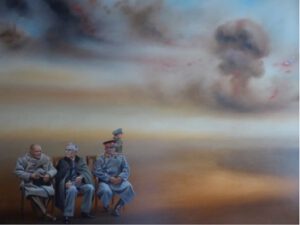
It’s so easy to take peace for granted, when we have it.
In my 2012 book, The Great Game: Berlin-Warsaw Express and Other Stories, the character Cal, an American writer living in Berlin, commits the sin of lamenting peace as dull. Boarding the train for Warsaw at Zoo station, looking out his window as the Reichstag and Brandenburg Gate slip by, he reflects on how “concrete, barbed wire and gun turrets had been replaced by a currywurst stand, shoe stores, and other unremarkable trappings of the everyday. Everything looked so normal, as if people had never argued let alone fought here. The graveyard of communism and fascism looked beautiful with its flowers and its river in the sunshine.”
But Cal – named for his safe, privileged, native California – was frustrated. “The banality of today’s prosperity be damned,” he thought. “‘Orson Welles was right about the cuckoo clocks.’ On this day, Cal was not interested in sunshine, flowers and rivers. He wanted shadows, smoke and bastards. He wanted danger.”






